

Control What Shows Up When Someone Googles Your Name: Step-By-Step Guide to Personal SEO for Students - College Raptor Blog. Google is a wonderful tool.
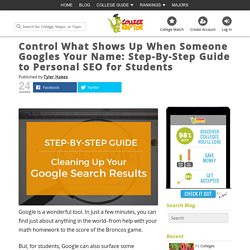
In just a few minutes, you can find just about anything in the world–from help with your math homework to the score of the Broncos game. But, for students, Google can also surface some less-than-ideal results when potential employers or college admissions reps search for them online. While it may seem like an afterthought to some students, the truth is that your reputation can be easily damaged by a simple internet search. What shows up in the Google search results for your name can mean a lot. So it’s important that you protect your reputation online and take steps to show yourself in the best possible light to whomever may be looking. This guide will walk you step by step through checking your Google search results and then how to reduce the impact of any negative items that might appear. Your Digital Footprint Matters "Your digital footprint paints a portrait of who you are as an educator, leader, school, or district.
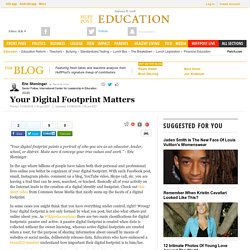
Make sure it conveys your true values and work. " - Eric Sheninger In the age where billions of people have taken both their personal and professional lives online you better be cognizant of your digital footprint. With each Facebook post, email, Instagram photo, comment on a blog, YouTube video, Skype call, etc. you are leaving a trail that can be seen, searched, or tracked. Basically all of your activity on the Internet leads to the creation of a digital identity and footprint. Kaplan Test Prep Online Pressroom » Kaplan Test Prep Survey: Percentage of College Admissions Officers Who Visit Applicants’ Social Networking Pages Continues to Grow — But Most Students Shrug. Press Releases, Survey Results Press Contacts: Russell Schaffer, russell.schaffer@kaplan.com, 212.453.7538 Twitter: @KapTestNews, @KaplanSATACT.
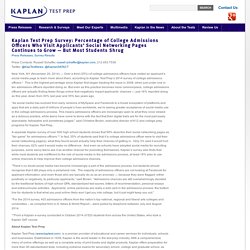
Social Media and College Admissions. Those photos of junior prom on Instagram need to go.
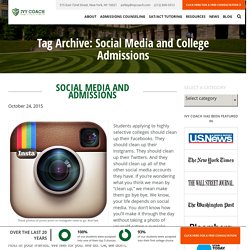
And fast. Posting with Purpose: Social Media Do's and Don'ts for College Bound Teens — Social Assurity LLC. Your children are being told to stay away from posting on social media.
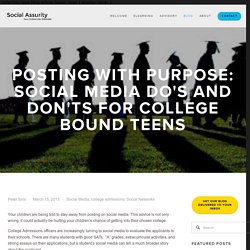
This advice is not only wrong, it could actually be hurting your children’s chance of getting into their chosen college. College Admissions officers are increasingly turning to social media to evaluate the applicants to their schools. There are many students with good SATs, “A” grades, extracurricular activities, and strong essays on their applications; but a student’s social media can tell a much broader story about the applicant. Job Killers: How social media can help you land or lose a job. Ten Statistics That Affect How People See You Online. You have access to more information now than at any time in human history.
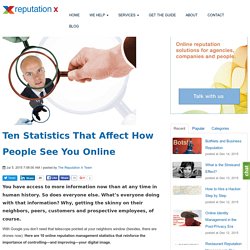
So does everyone else. What’s everyone doing with that information? Why, getting the skinny on their neighbors, peers, customers and prospective employees, of course. With Google you don’t need that telescope pointed at your neighbors window (besides, there are drones now). Here are 10 online reputation management statistics that reinforce the importance of controlling—and improving—your digital image. 9 Key Points for Cleaning Up Your Online Reputation Nightmare Via SEO. Building Your Social ID: The Elements of a Strong Digital Reputation. <h1 id="title">Building Your Social ID: The Elements of a Strong Digital Reputation</h1><div id="author"><div id="name">Ted Rubin</div><div id="title">Social Marketing Strategist, Keynote Speaker, Brand Evangelist and Acting CMO Brand Innovators, The Rubin Organization</div><div id="bio">Hi there, you can call me Ted.
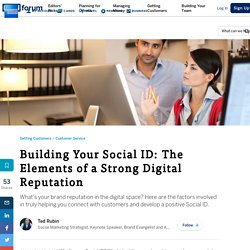
I'm Social Marketing Strategist, Keynote Speaker, Brand Evangelist and Acting CMO Brand Innovators at The Rubin Organization and I'm based in Greater New York City Area. What Does Your Digital Reputation Say About You? Posted 03/09/2015 6:45PM | Last Commented 03/13/2015 2:16AM I work with student teachers in a teacher credentialing program in California and noticed that some of them didn't quite understand the ramifications of posting inappropriate pictures or conversations to their social media accounts.
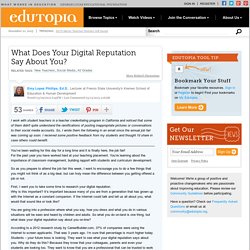
So, I wrote them the following in an email since the annual job fair was coming up soon. Building a Digital Reputation. How To Avoid “Status Jacking” And Protect Your Online Reputation? You may have noticed that when you are reading the latest facebook updates or scrolling through the recent post you come to see an odd post like “OMG This GUY Went A Little Too Far with His Revenge on His EX Girlfriend!.”

Did your friend really post this? If no then it means your facebook account has been “status jacked”. This example is to illustrate “Status jacking” as it is the act of literally hacking someone’s Facebook account and posting contents and photos and updating status without his/her notice . Recently we have heard about the MSNBC story that happen last year with a Microsoft employee whose Facebook account was hijacked by cyber criminals and they are posting status about how he was robbed in overseas, they insisted his friends to give money, some of them has payed the money also to them. Hacking dangers A numerous of websites have had their split of hacking harms.
80% Of College Admissions Officers Use Facebook To Check Out Students. Prospective college students, beware: There's yet another reason to make sure your Facebook profile is suitable for all. According to a Kaplan survey of college admissions officers, more than 80 percent of college admissions officers consider social media presence when recruiting students. Although this doesn't necessarily mean that Facebook and other online profiles will be considered in making admissions decisions, All Facebook reports that at least one Harvard admissions officer -- who posted on a Quora thread in response to the question "do high school students' Facebook profiles affect their college applications?
" -- said that a student's online presence "absolutely" prejudices her. Noodle. This topic gets a fair amount of coverage from the media and like most stories in the media these days the horror stories of kids losing out because of social media posts in more hype than reality I will add a couple of links and quotes and then talk more specifically about my personal experience with the issue and then raise some points that might be pertinent to your question.
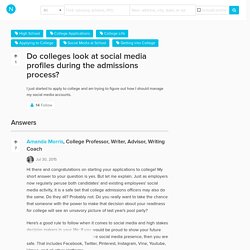
"Of 381 college admissions officers who answered a Kaplan telephone questionnaire this year, 31 percent said they had visited an applicant’s Facebook or other personal social media page to learn more about them — a five-percentage-point increase from last year. More crucially for those trying to get into college, 30 percent of the admissions officers said they had discovered information online that had negatively affected an applicant’s prospects. " NY Times. One bad tweet can be costly to a student athlete. They Loved Your G.P.A. Then They Saw Your Tweets. Social Media Shocker: Twitter and Facebook Can Cost You a Scholarship or Admissions Offer.
How To Avoid “Status Jacking” And Protect Your Online Reputation? Man loses job after Facebook post about 3-year-old boy. Kenneth Krause, Author of Email Criticizing Jennifer Livingston’s Weight, Responds to WKBT Editorial. Kenneth Krause’s critical email to Jennifer Livingston about her weight sparked a national controversy when the WKBT anchor delivered a forceful on-air editorial admonishing Krause for his bullying.
Krause responded to Livingston’s editorial in a statement to WKBT Tuesday afternoon (video above). “Given this country’s present epidemic of obesity and the many truly horrible diseases related thereto, and considering Jennifer Livingston’s fortuitous position in the community, I hope she will finally take advantage of a rare and golden opportunity to influence the health and psychological well-being of Coulee Region by transforming herself for all of her viewers to see over the next year, and, to that end, I would be absolutely pleased to offer Jennifer any advice or support she would be willing to accept,” Krause’s statement reads.
WKBT also reported Tuesday night on the community response to Livingston’s editorial. Watch after the jump. Uk.businessinsider. College player dismissed from team following offensive Mo'ne Davis tweet. Penn Admissions Officer Loses Job After Mocking Applicants on Facebook – The Ticker. In case you needed more proof that Facebook postings do not count as “private” interactions, The Daily Pennsylvanian reports that the University of Pennsylvania recently fired Nadirah Farah Foley, an employee in its admissions office, after she shared—and mocked—excerpts of students’ application essays on her Facebook page. According to the newspaper, Ms. Foley’s posts included quotations from essays as well as disdainful asides: In one essay, a student had written about his “long and deep” connections to the University, citing the fact that he had been circumcised at Penn Hillel years ago. “I look forward to engaging in the academic, social and Orthodox Jewish communities on campus,” the student wrote, according to Foley’s post.
“Stop the madness,” Foley said in response to the essay on Facebook.In another excerpt, she quoted an essay in which an applicant had described the experience of overcoming his fear of using the bathroom outdoors while camping in the wilderness. Return to Top. Facing the Consequences: Poor Social Media Choices Lead to Lost Jobs and Scholarships (with images) · Katie_M_Ritter. High schoolers wise up about social media when applying for colleges. High schoolers are increasingly aware that those embarrassing Facebook posts or tweets could cost them a shot at getting into their dream college.
The test prep company Kaplan found that only 16 percent of the 403 colleges surveyed found anything troubling in the social media posts they viewed -- a drop from 50 percent a year ago. That decline comes as the survey found more colleges are factoring social media into the application process: 35 percent in the latest survey compared to only 9 percent six years ago. Wes Waggoner, the dean of admissions at Southern Methodist University in Dallas, acknowledged he has seen cases where social media posts resulted in a rejection letter. But he said students now have a greater appreciation of the damage that a wild party shot can do.
Login. What are you revealing online? Much more than you think. What can be guessed about you from your online behavior? Two computer privacy experts — economist Alessandro Acquisti and computer scientist Jennifer Golbeck — on how little we know about how much others know. The best indicator of high intelligence on Facebook is apparently liking a page for curly fries. At least, that’s according to computer scientist Jennifer Golbeck (TED Talk: The curly fry conundrum), whose job is to figure out what we reveal about ourselves through what we say — and don’t say — online. Of course, the lines between online and “real” are increasingly blurred, but as Golbeck and privacy economist Alessandro Acquisti (TED Talk: Why privacy matters) both agree, that’s no reason to stop paying attention. TED got the two together to discuss what the web knows about you, and what we can do about the things we’d rather it forgot.
How Important Are Students' Digital Footprints? Education Week. Office of the Children's eSafety Commissioner.